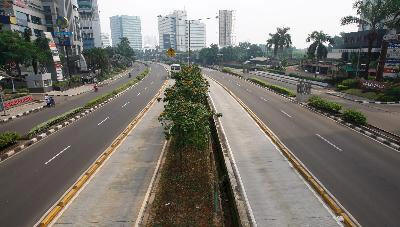Helpless locals send out laundry, dine out in malls
Agnes Winarti , The Jakarta Post , Jakarta | Sat, 10/04/2008 8:08 AM | Headlines
Those offering “laundry by the kilo” services are beaming over the plight of Jakartans inundated with dirty clothes and abandoned by their maids during Lebaran, just as mall restaurants happily draw in fami-lies bent on avoiding the kitchen stove.
“Most customers said their domestic workers had gone to their hometowns for the holidays,” Apik Primadya, owner of Apique’s House of Oembah-Oembah in Jatipadang, South Jakarta, told The Jakarta Post on Friday.
The House of Oembah-Oembah gets 30 to 40 percent more laundry during the holiday period, mostly from office workers living in rented rooms, university students and housewives.
“We usually get 50 kilograms a day, but lately we’ve been taking in 80,” said 25-year-old Apik, who keeps regular business hours during Lebaran.
Such laundry services, known locally as laundry kiloan, include washing and ironing. They have been mushrooming around the capital in recent years.
“Many people are perfectly willing to get their laundry into the machine. But the next step, ironing, is too daunting a task,” Apik said.
Another laundry operator, Bayu Listiaji, said he saw around four to five times more laundry drop-offs at his shops.
The laundry service takes in various garments and linens: Not just clothes but also bedcovers, curtains, sajadah (prayer mats) and mukena (the white full-body garments Muslim women wear when praying).
“On ordinary days we get 100 to 200 kilos of laundry but during the fasting month we can get as much as 400 to 500 kilos a day,” said Bayu, 31.
He said he expected to double his profits during the month of Ramadan and the culminating Idul Fitri holidays, from his usual Rp 15 million (US$1,580) to 25 million per shop. In general, he said, the business was thriving all year round.
Besides evading laundry and hot irons, people are also trying to escape cooking. With hosts of neighborhood eating places away for the holidays, many are turning to the malls to fill their stomachs.
“Our helper and nanny are still away. Taking care of the kids plus doing the chores plus cooking the meals is too much to handle. So we just eat out,” said Hendry, a businessman and father of two toddlers.
He said he did not care for malls but had found no other options at hand.
“The eateries near our house are closed and we don’t want to go to the crowded recreational places. There’s nowhere else to go with the children in Jakarta but the malls,” he said, adding his family had already visited three in two days.
Restaurants at the malls benefit. The eateries at Senayan City have more families walking through their doors.
Rizal, who works at one Thai-Japanese-Chinese restaurant there, said four out of every five groups coming to his restaurant were families.
“Usually around half of our customers come with their colleagues or friends. But that’s all changed during this holiday. Most are coming with their families instead.” (mri)




